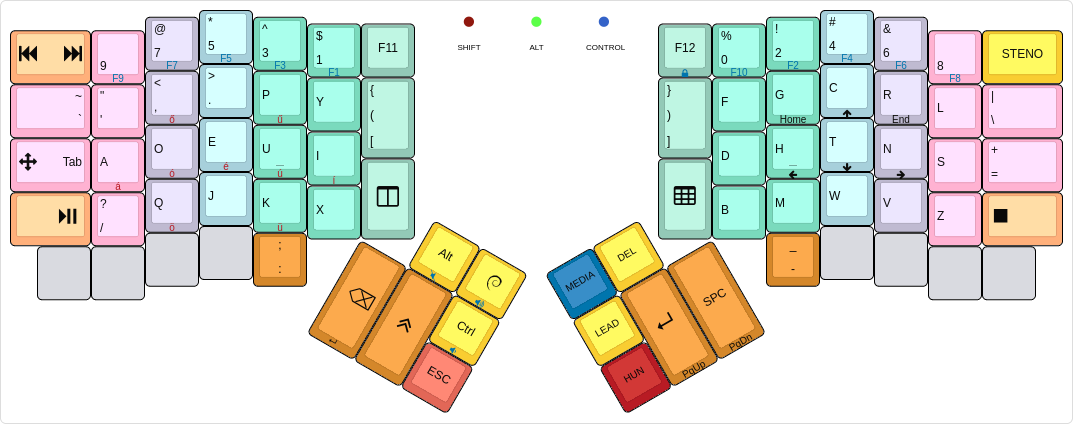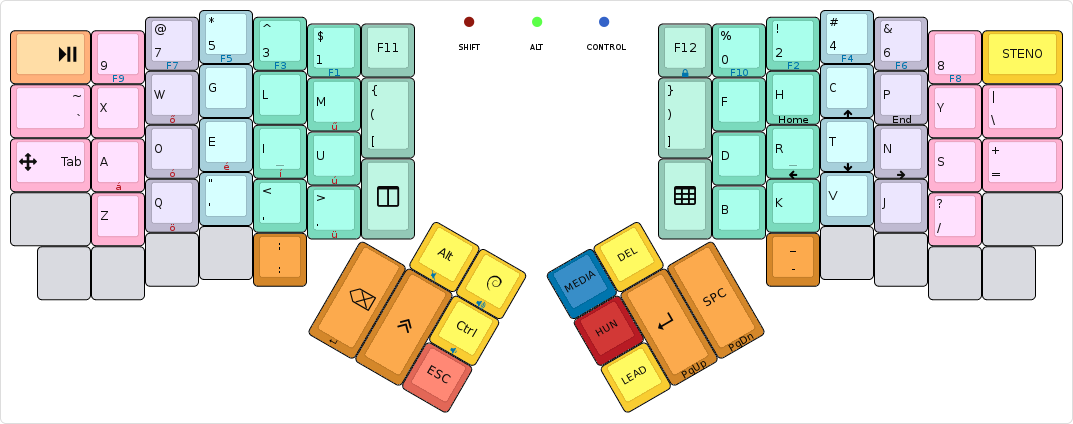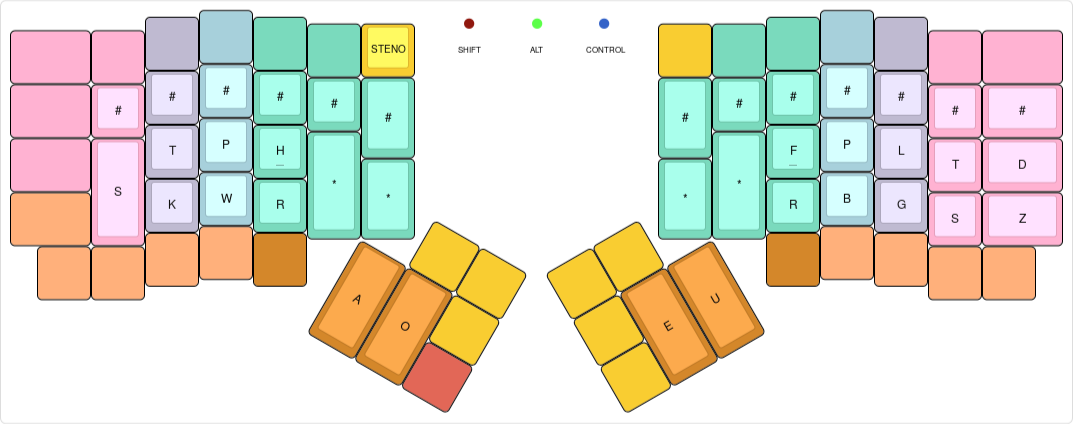Overall changes =============== * The number row has been completely rearranged on both the **Base** and the **ADORE** layers. * The number/function key behavior was changed: function keys are now on the **Media**. * The `:`/`;` and `-`/`_` keys were put back to their thumb position on the bottom row, on both the **Base** and **ADORE** layers. * The bottom large keys on the inner side of each half now function as [tmux](http://tmux.github.io/) keys: the left to send the prefix, the right to send the `display-panes` key. The left also doubles as a GNU screen prefix key, and sends `C-a` when double tapped. * A number of functions, such as the **AppSel** layer, now require the `hid-commands` tool to be running, with the output of `hid_listen` being piped to it. ADORE ===== * `Y` and `X` have been swapped again. Media/Navigation layer ====================== * The function keys are now on this layer. * Mouse keys have been removed. * Media start/stop/prev/next have been removed. * `Print screen` has been removed. * There is only one screen lock key now. Heatmap ======= * Fixed a few issues in the finger-stats calculation. * The tool now also timestamps and saves all input lines to a logfile, which it loads on start, allowing one to continue the collection after upgrading the tool. * The heatmap tool will now colorize the stats by default. * The periodic stats are now printed in a more compact format. Tools ===== * Added a new tool, `tools/layer-notify` that listens to layer change events on the HID console, and pops up a notification on layer changes. * Another new tool, `tools/text-to-log.py` has been added that converts arbitrary text to a keylogger output, which can be fed to the heatmap generator. * A number of features have been moved to the `tools/hid-commands` utility. These generally are OS dependent, and are easier to implement on the software side. Signed-off-by: Gergely Nagy <algernon@madhouse-project.org> |
||
|---|---|---|
| .. | ||
| images | ||
| tools | ||
| config.h | ||
| COPYING | ||
| keymap.c | ||
| Makefile | ||
| readme.md | ||
algernon's layout
This is an unconventional layout for the ErgoDox EZ. For more details about the history of the layout, see my blog posts about my ErgoDox journey.
Some of the things in the layout only work when one uses Spacemacs and GNOME under Linux. Your mileage may vary.
Table of Contents
Layouts
Base layer
At its core, this is a Dvorak layout, with some minor changes. The more interesting parts are how certain keys behave:
- The number row is the same as in the ADORE layer. The function keys are on the Media layer.
- The
Shift,Alt, andControlmodifiers are one-shot. When tapped, they are considered active for the next key press only. When double tapped, they toggle on, until a third, single tap sometime later. When held, they act as expected. My usual pattern is that I use these for the next keypress only, so this behaviour is perfect. If I need them held, I'll just double-tap. - The
GUIkey is special, because when I double-tap it, it sendsGUI + w, which pops up an application selector. It also switches to a one-shot layer, where the number row on the left half turns into app selector macros, for the most common things I usually want to switch to. Otherwise it behaves as on a normal layout. - The
ESCkey also doubles as a one-shot cancel key: if tapped while any of the one-shot modifiers are in-flight (as in, single-tapped, and not expired yet), it cancels all one-shot modifiers. It also cancels the Hun layer, if active. Otherwise it sends the usual keycode. - The Media and Hun layer keys are one-shot, the STENO key is a toggle.
- When holding the
Tab/Arrow key, the arrow layer activates while the key is held. Tapping the key produces the normal,Tabkey. Double-tapping it toggles the Arrow layer on until a third tap. - Tapping the
:key once yields:, tapping it twice yields;. - Tapping the
[{(/)}]keys once yields[(or{when shifted), tapping them twice yields(. - The Lead key allows me to type in a sequence of keys, and trigger some actions:
LEAD luses the unicode input method to enter aλ.LEAD sdoes a lot of magic to type in a shruggie:¯\_(ツ)_/¯LEAD ytypes\o/.LEAD w mmaximises the currently focused window.LEAD amakes the ADORE layer the default.LEAD vprints the firmware version, the keyboard and the keymap.LEAD dtoggles logging keypress positions to the HID console.LEAD ttoggles time travel. Figuring out the currentdateis left as an exercise to the reader.LEAD uenters the Unicode symbol input mode.
The symbols on the front in the image above have the same color as the key that activates them, with the exception of the Arrow layer, which is just black on the front.
ADORE layer
My experimental layout, that I keep tweaking. No full description here, because things are very much in flux.
Note that the HUN layer does not work well with ADORE: it still has the same layout as on the Base layer. This will remain until ADORE becomes the default.
Steno layer
This is to be used with Plover, nothing really fancy here. The STENO key toggles the layer on and off, and sends the toggle command to Plover too.
LED states
The primary purpose of the LEDs is to show the modifier status, a secondary, to show which layer is active. Each modifier, Shift, Alt and Control each have their designated LEDs: the red, green and blue, respectively. When a modifier is in a one-shot state, the respective LED will turn on with a dimmer light. If the modifier is toggled on, the brightness of the LED turns full.
For the layers, the following rules apply:
- When the ADORE layer is toggled on, LEDs will light up from left to right in a sequence, then turn off. When the layer is toggled off, the LEDs light up and turn off in the other direction. No LEDs are on while the layer is active.
- When the Hungarian layer is active, the green and blue LEDs are on.
- When the Media layer is active, the red and green ones are on.
- When the ARROW layer is active, the red and blue ones are on.
- For the Steno layer, all LEDs will be turned on.
Unless noted otherwise, the layers use a dim light for the LEDs, while modifiers use a stronger one, and modifiers override any layer preferences. For example, when on the one-handed layer, with the left side active (red light blinking), if Shift is on, the red light will be constantly on.
Special features
Unicode Symbol Input
Once in the Unicode Symbol Input mode, one is able to type in symbol names, press Enter or Space, and get the Unicode symbol itself back. When in the mode, a capital U is printed first. Once the sequence is finished, all of it is erased by sending enough Backspace taps, and the firmware starts the OS-specific unicode input sequence. Then, it looks up the symbol name, and enters the associated code. If it is not found, it will just replay the pressed keycodes.
The currently supported symbols are:
snowman: ☃kiss: 😙rofl: 🤣poop: 💩
This is an experimental feature, and may or may not work reliably.
Tools
Heatmap
When the keypress logging functionality is enabled (by LEAD d), the keyboard will output a line every time a key is pressed, containing the position of the key in the matrix. This allows one to collect this information, and build analytics over it, such as a heat map, including dead keys too.
Included with the firmware is a small tool that can parse these logs, and create a heatmap that one can import into KLE. To use it, either pipe the output of hid_listen into it, or pipe it an already saved log, and it will save the results into files in an output directory (given on the command-line). See the output of tools/log-to-heatmap.py --help for more information.
The generated heatmap looks somewhat like this:
Layer notification
There is a very small tool in tools/layer-notify, that listens to the HID console, looking for layer change events, and pops up a notification for every detected change. It is a very simple tool, mainly serving as an example.
Building
To make my workflow easier, this layout is maintained in its own repository. To build it, you will need the QMK firmware checked out, and this repo either checked out to something like keyboards/ergodox_ez/algernon-master. One way to achieve that is this:
$ git clone https://github.com/jackhumbert/qmk_firmware.git
$ cd qmk_firmware
$ git clone https://github.com/algernon/ergodox-layout.git \
keyboards/ergodox/keymaps/algernon-master
$ make keyboard=ergodox keymap=algernon-master
From time to time, updates may be submitted back to the QMK repository. If you are reading it there, you can build the firmware like any other firmware included with it (assuming you are in the root directory of the firmware):
$ make keyboard=ergodox keymap=algernon
Using on Windows
The keymap default to forcing NKRO, which seems to upset Windows, and except the modifiers, none of them work. If you experience this problem, recompile the firmware with FORCE_NKRO=no added to the make command line.
Changelog
v1.7
2016-09-18
Overall changes
- The number row has been completely rearranged on both the Base and the ADORE layers.
- The number/function key behavior was changed: function keys are now on the Media.
- The
:/;and-/_keys were put back to their thumb position on the bottom row, on both the Base and ADORE layers. - The bottom large keys on the inner side of each half now function as tmux keys: the left to send the prefix, the right to send the
display-paneskey. The left also doubles as a GNU screen prefix key, and sendsC-awhen double tapped. - A number of functions, such as the AppSel layer, now require the
hid-commandstool to be running, with the output ofhid_listenbeing piped to it.
ADORE
YandXhave been swapped again.
Media/Navigation layer
- The function keys are now on this layer.
- Mouse keys have been removed.
- Media start/stop/prev/next have been removed.
Print screenhas been removed.- There is only one screen lock key now.
Heatmap
- Fixed a few issues in the finger-stats calculation.
- The tool now also timestamps and saves all input lines to a logfile, which it loads on start, allowing one to continue the collection after upgrading the tool.
- The heatmap tool will now colorize the stats by default.
- The periodic stats are now printed in a more compact format.
Tools
- Added a new tool,
tools/layer-notifythat listens to layer change events on the HID console, and pops up a notification on layer changes. - Another new tool,
tools/text-to-log.pyhas been added that converts arbitrary text to a keylogger output, which can be fed to the heatmap generator. - A number of features have been moved to the
tools/hid-commandsutility. These generally are OS dependent, and are easier to implement on the software side.
v1.6
2016-08-24
Base layer changes
- The parentheses & bracket keys have been merged: tapping them results in
[or{(if it was shifted), double tapping leads to(. - The
:;and-_keys are now available on the base layer, on their ADORE location, too, just below[{(/]}). - The
Appskey has been replaced byF12. - The
-/_is no longer a tap-dance key.
ADORE layer changes
- Adjustments were made to the ADORE layer, to separate some inconvenient combinations.
Miscellaneous changes
LEAD unow starts the symbolic unicode input system, instead of the OS-one.- The mouse acceleration keys on the Navigation/Media layer have been turned into toggles: tap them once to turn them on, until tapped again. Tapping an accelerator button will turn all the others off.
- When the ARROW layer is on, the red and blue LEDs light up now.
Heatmap
- The built-in keylogger has been greatly enhanced, it now outputs the pressed state, and the layer (Dvorak or ADORE). As such, the
ADORE_AUTOLOGoption has been removed, instead there isAUTOLOG_ENABLEnow, which when enabled, makes the keylogger start when the keyboard boots. It defaults to off. - The heatmap generator received a lot of updates.
v1.5
2016-08-12
- The 1HAND layer has been removed.
- A
Deletekey is now available on the right thumb cluster. - The ADORE layer received a major update, see the layout image above.
- It is now possible to enable automatic logging for the ADORE layer, by setting the
ADORE_AUTOLOGmakefile variable toyeswhen compiling the keymap. It is off by default. - The
~key and theMedia Next/Prevkey have been swapped on the base layer. - On the ARROW layer,
Backspacehas been replaced byEnter. - There is some experimental support for entering Unicode symbols.
v1.4
2016-07-29
- When toggling the key logging on or off, the LEDs will do a little dance.
- The keylogger is now optional, but enabled by default. Use
KEYLOGGER_ENABLE=noon themakecommand line to disable it. - The
TAB/ARRWkey was turned into a tap-dance key, allowing one to toggle the ARROW layer on by double-tapping, and as such, avoid the need to hold the key. - The
-/_key was turned into a tap-dance key too. - There is now a way to travel time with the keyboard, toggle the feature on by hitting
LEAD t.
v1.3
2016-07-06
- Added support for logging keys, by pressing
LEAD d. Also included is a tool to generate a heatmap out of the logs. - The arrow and navigation keys were rearranged again, and now require an additional key being held to activate. See the base layer for an image that shows where arrows are.
- The experimental layer has been redone, and is now called ADORE, and as such, can be enabled by
LEAD anow. - Switching between Dvorak and ADORE is now persisted into EEPROM, and survives a reboot.
v1.2
2016-06-22
- The forced NKRO mode can be easily toggled off at compile-time, to make the firmware compatible with certain operating systems.
- The
:;key has changed behaviour: to access the;symbol, the key needs to be double-tapped, instead of shifted. - The
=and\keys were swapped,=moved to the home row, on both the base and the experimental layers. - The arrow and navigation keys were redone, they are now more accessible, but the navigation keys require an extra tap to access.
- The Emacs layer is gone, replaced by a simplified navigation and media layer.
LEAD vtypes the firmware version, and the keymap version.- On the experimental layer, the
LandQ, and theKandGkeys were swapped. - The Steno layer gained a few more
#and*keys, to make it easier on my fingers.
v1.1
2016-06-14
- The keyboard starts in NKRO mode, bootmagic and other things are disabled.
- A Steno layer was added, to be used with Plover.
- An experimental layer was added, something halfway between Dvorak and Capewell-Dvorak. A work in progress.
LEAD ytypes\o/.- Some keys on the Base layer have been moved around:
?moved to the left pinky, left ofQ.=shifted one row down, butF11stayed where it was.-on the left half was replaced byTab.Tab's original position is taken by aMedia Next/Media Prevkey.:now inputs;when shifted.
ESCcancels the Hungarian layer too, not just modifiers.
v1.0
2016-05-26
Initial version.
License
The layout, being a derivative of the original TMK firmware which is under the GPL-2+, this layout is under the GPL as well, but GPL-3+, rather than the older version.



